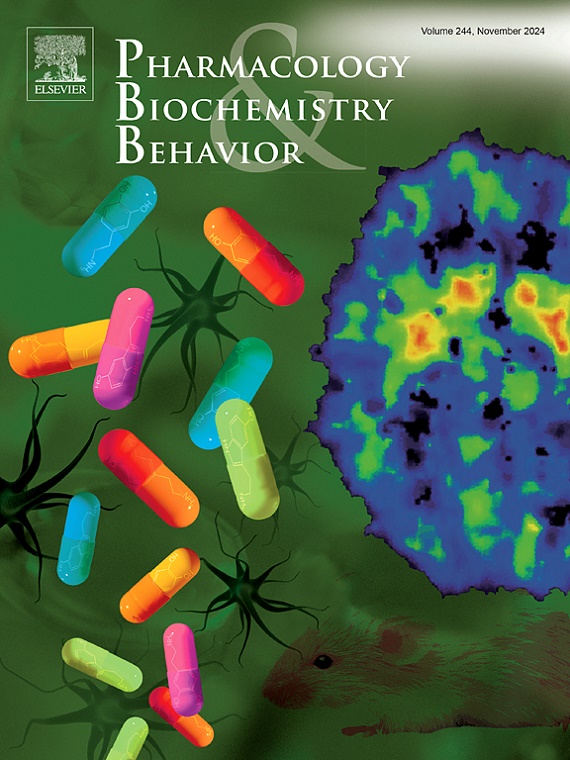脾脏γδT细胞在脂多糖诱导的小鼠抑郁中介导了开塞露的抗抑郁和预防作用。
IF 3.3
3区 心理学
Q1 BEHAVIORAL SCIENCES
引用次数: 0
摘要
氯胺酮的(R)-对映体阿克他敏在炎症驱动的抑郁症模型中表现出治疗和持续预防作用,但其确切机制仍难以捉摸。鉴于γδ T 细胞参与了炎症过程,本研究探讨了它们在阿卡他敏作用中的作用。为了评估治疗效果,小鼠先接受脂多糖(LPS:1.0 毫克/千克)治疗,然后再接受阿克他敏(10 毫克/千克)或生理盐水治疗。为了进行预防性评估,在接触 LPS 前六天给小鼠注射阿克他敏或生理盐水。单剂量LPS(1.0毫克/千克)可降低脾脏中γδT细胞的比例,但不会影响其在血液、前额叶皮质或小肠中的水平。阿卡他敏减轻了LPS诱导的脾肿大,抵消了血浆白细胞介素-6水平的升高和脾脏γδT细胞比例的降低,并减轻了强迫游泳试验评估的抑郁样行为。值得注意的是,脾脏γδ T细胞比例与炎症和抑郁指标之间呈负相关。此外,用γδ TCR 抗体进行预处理可明显抵消阿卡他敏对 LPS 诱导的变化的治疗和预防作用。这些发现凸显了脾脏γδ T 细胞在炎症相关抑郁中的新作用,并表明阿可他敏有可能成为一种治疗选择。因此,γδ T 细胞可能是治疗炎症相关抑郁症的新靶点。关于γδ T 细胞在炎症性抑郁症患者中的作用,还有待进一步研究。本文章由计算机程序翻译,如有差异,请以英文原文为准。
Splenic γδ T cells mediate antidepressant and prophylactic actions of arketamine in lipopolysaccharide-induced depression in mice
Arketamine, the (R)-enantiomer of ketamine, exhibits both therapeutic and sustained prophylactic effects in an inflammation-driven model of depression, although the precise mechanisms remain elusive. Given the involvement of γδ T cells in inflammatory processes, this study explored their role in the effects of arketamine. To assess therapeutic outcomes, mice received lipopolysaccharide (LPS:1.0 mg/kg), followed by either arketamine (10 mg/kg) or saline. For prophylactic assessment, arketamine or saline was administered six days prior to LPS exposure. A single dose of LPS (1.0 mg/kg) reduced the proportion of γδ T cells in the spleen but did not affect their levels in the blood, prefrontal cortex, or small intestine. Arketamine mitigated LPS-induced splenomegaly, counteracted the elevation of plasma interleukin-6 levels and the reduction in the proportion of splenic γδ T cells, and alleviated depression-like behavior as assessed by the forced swimming test. Notably, negative correlations were observed between the proportion of splenic γδ T cells and indicators of inflammation and depression. Furthermore, pretreatment with a γδ TCR antibody significantly countered the therapeutic and prophylactic effects of arketamine on LPS-induced changes. These findings highlight a novel role for splenic γδ T cells in inflammation-associated depression and suggest the potential of arketamine as a treatment option. Consequently, γδ T cells may represent a novel therapeutic target for inflammation-related depression. Further studies on the role of γδ T cells in depressed patients with inflammation are warranted.
求助全文
通过发布文献求助,成功后即可免费获取论文全文。
去求助
来源期刊
CiteScore
6.40
自引率
2.80%
发文量
122
审稿时长
38 days
期刊介绍:
Pharmacology Biochemistry & Behavior publishes original reports in the areas of pharmacology and biochemistry in which the primary emphasis and theoretical context are behavioral. Contributions may involve clinical, preclinical, or basic research. Purely biochemical or toxicology studies will not be published. Papers describing the behavioral effects of novel drugs in models of psychiatric, neurological and cognitive disorders, and central pain must include a positive control unless the paper is on a disease where such a drug is not available yet. Papers focusing on physiological processes (e.g., peripheral pain mechanisms, body temperature regulation, seizure activity) are not accepted as we would like to retain the focus of Pharmacology Biochemistry & Behavior on behavior and its interaction with the biochemistry and neurochemistry of the central nervous system. Papers describing the effects of plant materials are generally not considered, unless the active ingredients are studied, the extraction method is well described, the doses tested are known, and clear and definite experimental evidence on the mechanism of action of the active ingredients is provided.

 求助内容:
求助内容: 应助结果提醒方式:
应助结果提醒方式:


